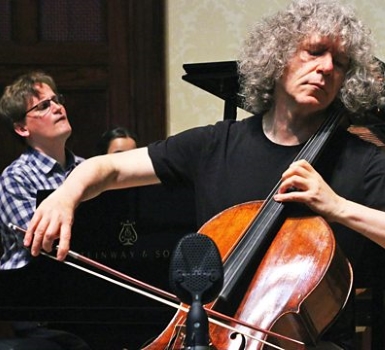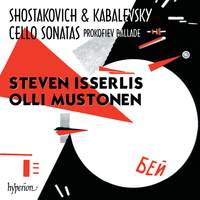Recording of the Week,
Steven Isserlis and Olli Mustonen perform cello sonatas by Shostakovich and Kabalevsky
Reuniting with pianist Olli Mustonen (with whom he recorded a wonderful set of Martinů's cello sonatas a few years ago), for his latest recording Steven Isserlis presents a selection of Russian repertoire for cello and piano, the centrepiece of which is the sonata by Dmitri Shostakovich. The first thing that struck me about their performance here is how spacious the opening tempo is (certainly when compared to Shostakovich's own 1959 recording with Rostropovich: in both the first and last movements Isserlis and Mustonen are a full minute slower than their predecessors). However, such is the conviction of their playing that it never felt sluggish to me, and with Isserlis's varying choices of tone, their performance takes on a rhapsodic, wistful mood that is captivating to listen to.
 Mustonen proves himself to be an ideal partner for these pieces, weighty and powerful when required, and yet also able to pull his sound right back to a barely-audible, percussive attack, particularly the coda of the first movement where he matches Isserlis's hushed tone every step of the way. If the first movement seems somewhat relaxed, then they certainly ramp it up several notches in the second movement, a tour de force for both players, with impressive harmonic glissandos and extended passages played on the bridge of the instrument standing out as highlights in an immensely satisfying performance not just of this movement but of the entire sonata.
Mustonen proves himself to be an ideal partner for these pieces, weighty and powerful when required, and yet also able to pull his sound right back to a barely-audible, percussive attack, particularly the coda of the first movement where he matches Isserlis's hushed tone every step of the way. If the first movement seems somewhat relaxed, then they certainly ramp it up several notches in the second movement, a tour de force for both players, with impressive harmonic glissandos and extended passages played on the bridge of the instrument standing out as highlights in an immensely satisfying performance not just of this movement but of the entire sonata.
An almost exact contemporary of Shostakovich, Dmitry Kabalevsky is perhaps best known today for his piano music for children and so-called “student” pieces such as the Violin Concerto, but there is nothing easy about his Cello Sonata (written for and premiered by Rostropovich). Both Isserlis and Mustonen are of the opinion that it is a masterly work, and I must say that on the basis of this recording I wholeheartedly agree! It's a fiendishly virtuosic piece, not least the final movement with its rapid semiquavers, double stops, and frequent sudden leaps into the very high register. Although there are occasional moments where it reminded me stylistically of Shostakovich and Prokofiev (especially the last movement which put me in mind of the Act One Fight from the latter's Romeo and Juliet ballet), it's very much its own piece, and is part of an incredibly well-considered programme that the two performers have put together.
This programme includes the Adagio arranged by Prokofiev from another ballet of his, Cinderella, as well as a brief Moderato by Shostakovich (the manuscript for which was only discovered in 1986), but for me the jewels are the Ballade by Prokofiev, and Kabalevsky's Rondo written in 1965. The Ballade (written when Prokofiev was just twenty-one) gives Isserlis ample chance to display a remarkable range of sounds and effects; the central section has one of the longest pizzicato passages in the solo repertoire (“quite a strain on the cellist's poor thumb”, says Isserlis!), and it’s played with great gusto here. I distinctly enjoyed his wide vibrato on some of the louder, more exposed pizzicato notes, giving the instrument an almost bass guitar-like twang. This gives way to a more plangent, wailing melody which is full of huge leaps and mournful expression in the higher registers, again expertly performed by Isserlis.
This use of the high register is echoed by Kabalevsky in his Rondo in memory of Prokofiev, written for what would have been Prokofiev's seventy-fifth year. The almost Mahlerian shrieks of grief from the cello are quite moving, and the piece as a whole makes for a poignantly contemplative close to an exceptionally thoughtful selection of works.
Steven Isserlis (cello) & Olli Mustonen (piano)
Available Formats: CD, MP3, FLAC, Hi-Res FLAC



